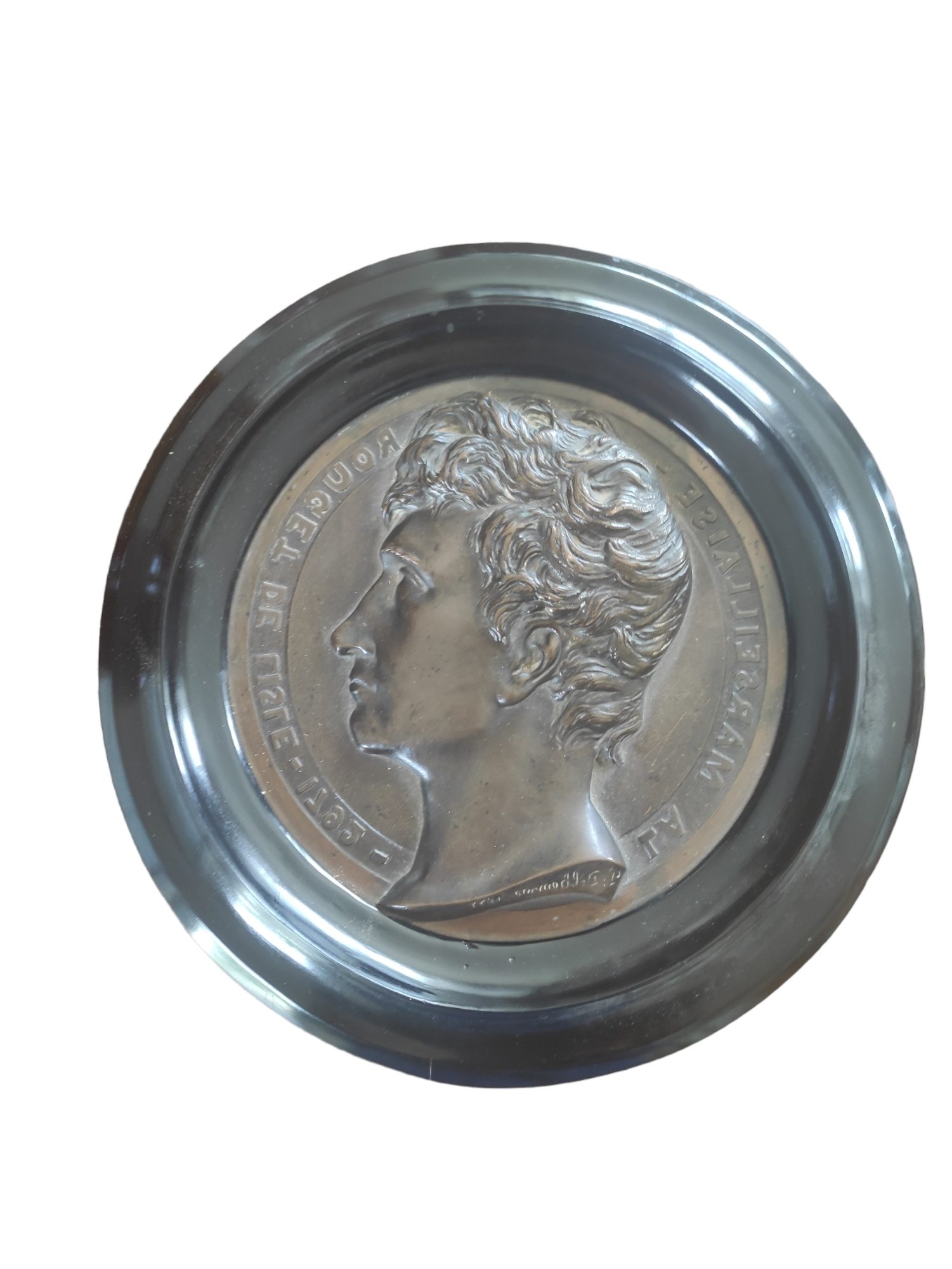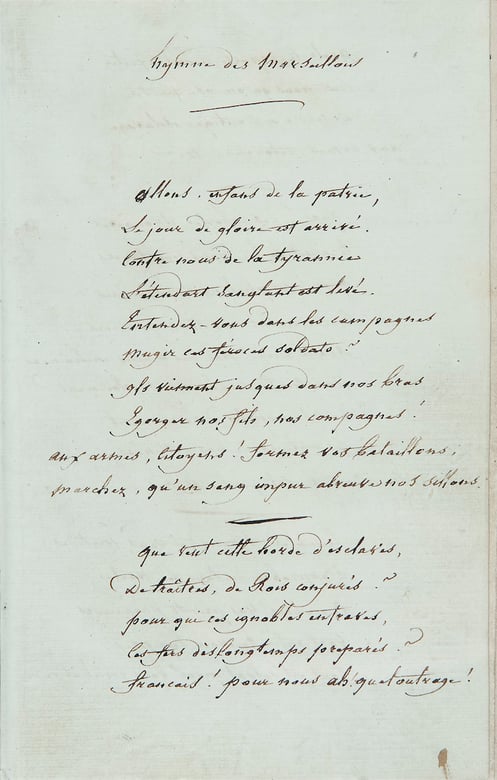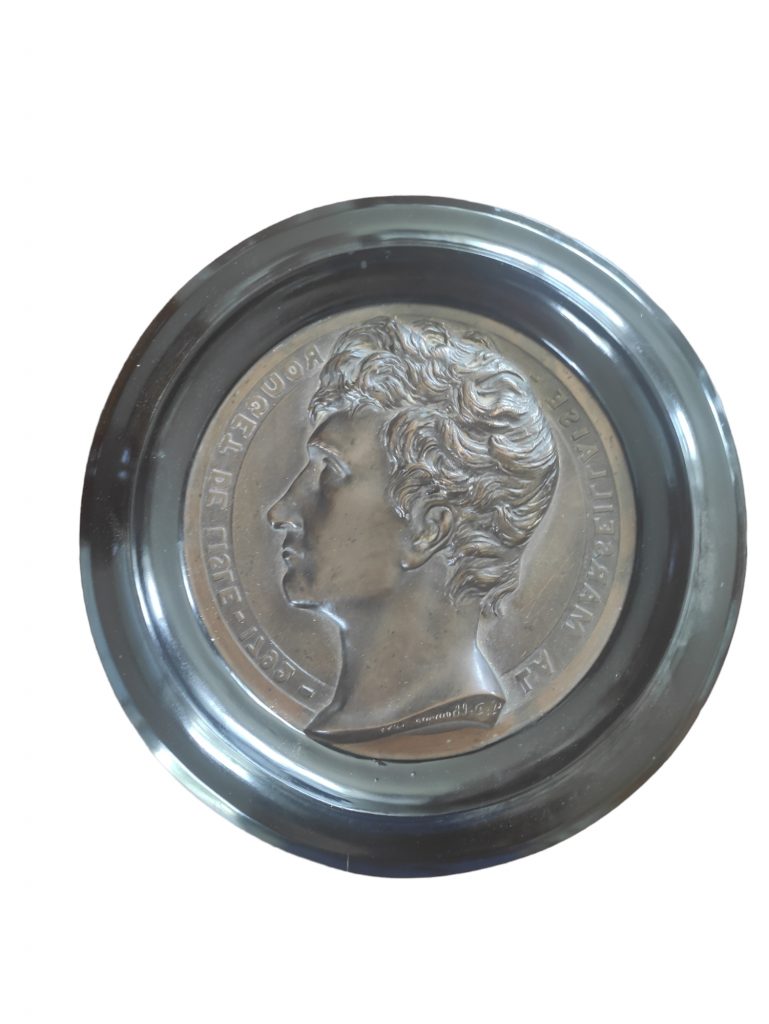
La Marseillaise. Rouget de Lisle 1792
09/08/2023L’histoire a fait de ce chant de guerre révolutionnaire un hymne national aux accents de liberté, qui accompagne aujourd’hui la plupart des manifestations officielles.
Son auteur, Claude-Joseph Rouget de Lisle, né 1760 à Lons-le-Saunier, était capitaine du génie sous la Révolution. Dans la nuit du 25 au 26 avril 1792, à la suite de la déclaration de guerre de la France à l’empereur d’Autriche, il composa chez le maire de Strasbourg, dénommé Dietrich, un morceau qu’il intitula « Chant de guerre pour l’armée du Rhin ».

Bibliothèque Nationale
L’hymne fut d’abord diffusé en Alsace sous forme manuscrite ou imprimée, avant d’être repris par de nombreux éditeurs parisiens. Entonné par les fédérés de Marseille participant à l’insurrection des Tuileries le 10 août 1792, il se répandit de bouche à oreille, et son succès fut tel qu’il fut déclaré chant national le 14 juillet 1795.
Il n’existe pas de version unique de la Marseillaise, qui fut mise en musique dès le début sous des formes variées, avec ou sans chant. Les premières éditions n’étaient pas signées, ce qui fit douter que Rouget de Lisle, compositeur par ailleurs plutôt médiocre, en fût réellement l’auteur. Dépassé par le retentissement de son œuvre, il retourna à l’anonymat après la Révolution, n’écrivant que quelques compositions sans succès.
Interdite sous l’Empire et la Restauration, la Marseillaise fut remise à l’honneur lors de la Révolution de 1830. Berlioz en élabora alors une orchestration qu’il dédia à Rouget de Lisle. Le roi Louis Philippe lui préféra un autre hymne plus modéré, la Parisienne.
La IIIe République choisit la Marseillaise en 1879 comme hymne national, sans définir d’harmonisation d’officielle. Face au grand désordre musical qui en découlait lorsque des orchestres différents se réunissaient, il fallut choisir une version de référence. Le ministère de la guerre s’en chargea en 1887, sur proposition d’une commission de musiciens professionnels.
Le 14 juillet 1915, les cendres de Rouget de Lisle furent transférées aux Invalides.
En septembre 1944, une circulaire du ministère de l’Éducation nationale préconisa de faire chanter la Marseillaise dans les écoles pour « célébrer notre libération et nos martyrs ». Son caractère d’hymne national fut réaffirmé dans l’article 2 des constitutions de 1946 et de 1958.
Le rythme varia au cours des années : jouée un peu plus vite au XXe siècle que dans sa composition d’origine, elle fut légèrement ralentie par le président Valéry Giscard d’Estaing. Son successeur François Mitterrand revint à la version plus rapide, qui prévaut aujourd’hui.
Au cours de ses deux siècles d’existence, la Marseillaise a inspiré de nombreux morceaux, de l’opéra au jazz.

Couplet n°1
Allons enfants de la Patrie,
Le jour de gloire est arrivé !
Contre nous de la tyrannie,
L’étendard sanglant est levé, (bis)
Entendez-vous dans les campagnes
Mugir ces féroces soldats ?
Ils viennent jusque dans vos bras
Égorger vos fils, vos compagnes !
Refrain
Aux armes, citoyens,
Formez vos bataillons,
Marchons, marchons !
Qu’un sang impur
Abreuve nos sillons !
Couplet n°2
Que veut cette horde d’esclaves,
De traîtres, de rois conjurés ?
Pour qui ces ignobles entraves,
Ces fers dès longtemps préparés ? (bis)
Français, pour nous, ah ! quel outrage
Quels transports il doit exciter !
C’est nous qu’on ose méditer
De rendre à l’antique esclavage !
Couplet n°3
Quoi ! des cohortes étrangères
Feraient la loi dans nos foyers !
Quoi ! ces phalanges mercenaires
Terrasseraient nos fiers guerriers ! (bis)
Grand Dieu ! par des mains enchaînées
Nos fronts sous le joug se ploieraient
De vils despotes deviendraient
Les maîtres de nos destinées !
Couplet n°4
Tremblez, tyrans et vous perfides
L’opprobre de tous les partis,
Tremblez ! vos projets parricides
Vont enfin recevoir leurs prix ! (bis)
Tout est soldat pour vous combattre,
S’ils tombent, nos jeunes héros,
La terre en produit de nouveaux,
Contre vous tout prêts à se battre !
Couplet n°5
Français, en guerriers magnanimes,
Portez ou retenez vos coups !
Épargnez ces tristes victimes,
À regret s’armant contre nous. (bis)
Mais ces despotes sanguinaires,
Mais ces complices de Bouillé,
Tous ces tigres qui, sans pitié,
Déchirent le sein de leur mère !
Couplet n°6
Amour sacré de la Patrie,
Conduis, soutiens nos bras vengeurs
Liberté, Liberté chérie,
Combats avec tes défenseurs ! (bis)
Sous nos drapeaux que la victoire
Accoure à tes mâles accents,
Que tes ennemis expirants
Voient ton triomphe et notre gloire !
Couplet n°7
Nous entrerons dans la carrière
Quand nos aînés n’y seront plus,
Nous y trouverons leur poussière,
Et la trace de leurs vertus, (bis)
Bien moins jaloux de leur survivre,
Que de partager leur cercueil,
Nous aurons le sublime orgueil,
De les venger ou de les suivre
Le septième couplet, dont l’auteur reste à ce jour inconnu, a été ajouté en 1792.
